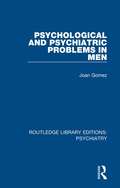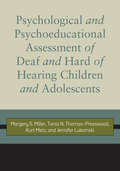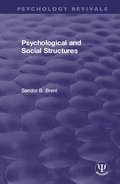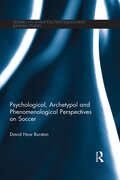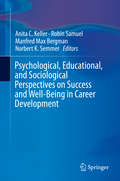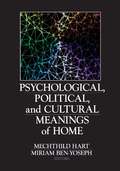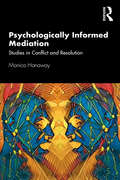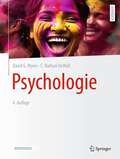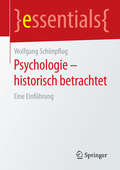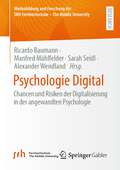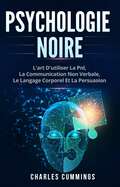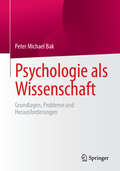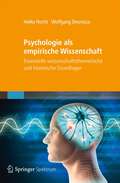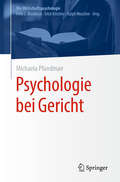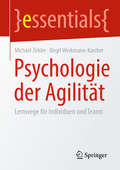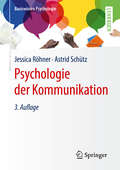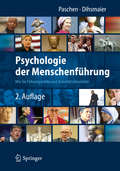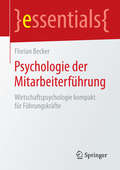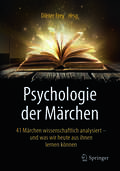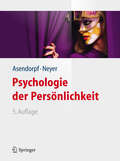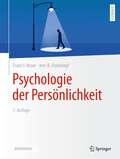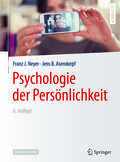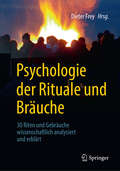- Table View
- List View
Psychological and Psychiatric Problems in Men (Routledge Library Editions: Psychiatry #10)
by Joan GomezWhat causes a man to become depressed or even psychotic? This book, originally published in 1991, provides an account of a grossly neglected subject: the social, sexual, psychological and psychiatric problems facing men. Dealing with issues such as aggression, violence, criminality, sexuality, and alcohol and drug dependence, it will be essential reading for health professionals, social workers and welfare officers, as well as those interested in gender studies.
Psychological and Psychoeducational Assessment of Deaf and Hard of Hearing Children and Adolescents
by Kurt Metz Tania N. Thomas-Presswood Jennifer Lukomski Margery S. MillerThe obstacles to valid and meaningful assessment of deaf and hard of hearing children and adolescents are great, yet professionals are regularly asked to conduct comprehensive evaluations to determine resource and program eligibility, test modifications in school, classroom and home recommendations, and referrals. In this important new text, the authors define the skills required of the examiners, explain the complex nature of these assessments, and describe ways to intelligently use existing tests. Authors Margery S. Miller, Tania Thomas-Presswood, Kurt Metz, and Jennifer Lukomski bring a wealth of knowledge and experience to this in-depth treatment of topics essential to educators and school psychologists. They cover such critical areas as test construction and measurement; the diversity in American Deaf culture; the role of parents in the assessment process; neuropsychological assessments; nonverbal methods for assessing intelligence; and the need for sign language competency when testing cognitive and language skills. The text concludes with recommendations for the development of valid and reliable tests for all students who are deaf and hard of hearing.
Psychological and Social Structures (Psychology Revivals)
by Sandor B. BrentOriginally published in 1984, this work is organised in three parts. Each part consists of several related chapters. Each chapter explores the assumptions and implications of a closely related group of concepts in depth. Part 1 explores what a structure is. It considers such notions as content, context, constraint, unity, integrity, and the hierarchical and nucleate forms of organization. Part 2 critically explores the dynamic (energic) conceptualization of psychological and social phenomena. Thus, this part considers such notions as energy, entropy, activity, confirmation, discrepancy, and resistance, as they apply to and affect the stability, activity, and changes observed in psychological and social structures. The relationship among the biological (metabolic), psychological, and social levels of analysis are explored from a rather simplified thermodynamic point of view. In Part 3 brings all these earlier considerations to bear upon the processes by which these structures grow and develop. It explores the concept of development itself, and such related issues as the levels-by-stages model of development, the distinction between intrastructural and intergenerational development, the orthogenic principles, the process of primordial differentiation and integration, development as a dialectical process, and the relationship between growth and development. The Epilogue indicates briefly some of the implications of the present thesis for future empirical and theoretical investigations.
Psychological, Archetypal and Phenomenological Perspectives on Soccer (Research in Analytical Psychology and Jungian Studies)
by David Huw BurstonSoccer, or football, attracts vast numbers of passionate fans from all over the world; yet clinical psychology is yet to study it in depth. In this book, David Huw Burston, a consultant football psychology and performance coach, uses a phenomenological research method inspired by Amedeo Giorgi to consider what we can learn from the spirit of the game, and how this can be used positively in the consulting room and on the field of play. By examining detailed qualitative research with professional soccer players of both sexes, Burston identifies and considers nine particular themes, including the family, god, heroes and dreams, and discusses how what we can learn from the game of football and team culture can be applied to Jungian analysis today. This book bridges the gap between clinical psychology and sport, outlining potential shortfalls in current youth development in sport, as well as discussing how traditional Jungian archetypes can be identified in everyday settings. It will be of key interest to researchers from both the fields of analytical psychology and sports studies.
Psychological, Educational, and Sociological Perspectives on Success and Well-Being in Career Development
by Manfred Max Bergman Anita C. Keller Robin Samuel Norbert K. SemmerThis collection covers how success and well-being relate to each other in early career development in the domains of employment and education. It gives a conceptual overview of success and well-being as established in the psychological research tradition, complemented by educational and sociological approaches. The volume presents articles on success and well-being in applied contexts, such as well-being as an individual resource during school-to-work transition, or well-being and success at the workplace. Work psychologists, social psychologists, educational researchers, and sociologists will find this book valuable, as it provides unique insights into social and psychological processes afforded by the combination of disciplines, concepts, and a diversity of approaches.
Psychological, Political, and Cultural Meanings of Home
by Mechthild Hart Miriam Ben-YosephDiscover different dimensions of the meaning of home across political, cultural, and geographic boundaries!Psychological, Political, and Cultural Meanings of Home brings a unique multidisciplinary, multicultural approach to address the interconnection of diverse experiences with the meaning of home. Filled with useful insights from respected authorities, this book shows you that the meaning of home can be incredibly varied, especially when viewed in the context of community psychology and social work. Explore the multiple facets of the meaning of "home," and discover how our personal, professional, cultural, and political background contributes to how we envision or experience home.From physical dwellings such as a convent or a prison, through political frameworks that confirm or challenge the status quo, on through the related meanings of home that cross cultural and geographical boundaries, Psychological, Political, and Cultural Meanings of Home presents an added dimension of what home truly can be. You will learn that home is a volatile mix of yearning and loss, of being at home or searching for it, and that this very mix is the framework that reflects each differing belief.With Psychological, Political, and Cultural Meanings of Home you&’ll explore: the changing meanings of home for Taiwanese employers of foreign domestics under globalization the opportunities and critical success factors for work and career in the home the complexities and restrictions of convent life as home how women detainees in a large urban county jail form altered definitions of "home" how novelists can give a powerful voice to the homeless by creating an inner image that contains all essential elements of home the cultural constructions surrounding the ambiguous lyrics of "Sweet Home Chicago" the role of childhood immigration in the construction of self-identity the relationship between country of origin and the ability to create a sense of home in other countries and cultures the recreation of home in diverse places by the nomad, who carries home as an essential psychological belonging withinPsychological, Political, and Cultural Meanings of Home is a fascinating, eye-opening book for those in community studies, psychology, sociology, culture studies, literature, and women&’s studies.
Psychologically Informed Mediation: Studies in Conflict and Resolution
by Monica HanawayPsychologically Informed Mediation explores the understanding of conflict and the use of a psychologically informed mediation approach to help resolve it. The book has two distinct parts; it starts with looking at our understanding of conflict, and challenges the more negative views, placing conflict as essential for dynamic development. It then describes the process of mediation and looks at several different models. The author draws on existential and phenomenological philosophy and psychology, and shows how they can enable a mediator to facilitate a meaningful resolution of conflict. The second part of the book offers eight dramatised case studies to illustrate the psychological and relational nature of conflict, giving detailed analysis of the mediation process using supportive theoretical material where relevant. This book offers a unique approach to mediation, and is accessible to a broad audience.
Psychologie
by David G. Myers C. Nathan DeWallDieses umfassende, bunte Lehrbuch von David Myers und Nathan DeWall enthält alles, was die Psychologie ausmacht – alle Grundlagenfächer aus dem Studium und die Anwendungsfächer Klinische, Pädagogische und Arbeits- und Organisationspsychologie – und macht großen Spaß, durch Nähe zum Alltag und hunderte bunte Abbildungen und Cartoons, die Psychologie witzig auf den Punkt bringen. Auch die 4. Auflage des Buches wurde unter Mitarbeit von Studierenden komplett überarbeitet – und ist damit genau wie die ganze Psychologie: vielfältig und schillernd, wissenschaftlich fundiert, eine Möglichkeit, sich mit eigenen Erfahrungen und fremden Kulturen auseinanderzusetzen. – Kurz gesagt: Nah am Leben!
Psychologie - historisch betrachtet: Eine Einführung (essentials)
by Wolfgang SchönpflugWolfgang Schönpflug bietet in diesem essential eine auf zehn Schwerpunkte konzentrierte Einführung in die Psychologie. Das Buch schildert Theorien und Methoden sowie Arbeitsgebiete und Institutionen, mit denen Psychologie als Wissenschaft und als Beruf in die Moderne gelangt ist. Zu erklären ist die moderne Psychologie in ihrer Diversität und Widersprüchlichkeit am besten durch den Rückblick auf ihre Ursprünge und Entwicklungslinien. Daher ist der Ansatz dieser Schrift ein historischer. Im Rückblick auf die Geschichte der Psychologie zeigen sich auch deren nachhaltige Beziehungen zu einer kritischen Öffentlichkeit sowie zu benachbarten Disziplinen.
Psychologie Digital: Chancen und Risiken der Digitalisierung in der angewandten Psychologie (Weiterbildung und Forschung der SRH Fernhochschule – The Mobile University)
by Sarah Seidl Ricardo Baumann Manfred Mühlfelder Alexander WendlandWesentliches Ziel dieses Sammelbandes ist es, einen Überblick über die Chancen und Risiken der Digitalisierung in verschiedenen Anwendungsbereichen der Psychologie zu entwickeln, z. B. in der Gesundheitsförderung, im Personalmanagement, in der psychosozialen Beratung oder in therapeutischen Beziehungen.Die Beiträge sollen die Vielfalt der Auswirkungen und Gestaltungsmöglichkeiten digitaler Medien auf und für die psychologische Profession aufzeigen und kritisch diskutieren. Dabei werden insbesondere empirische Arbeiten, Übersichtsarbeiten und konzeptionelle psychologische Arbeiten fokussiert.
Psychologie Noire: L'art d'utiliser la PNL, la communication non verbale, le langage corporel et la persuasion
by Charles CummingsAvez-vous déjà pensé à l'utilité de persuader les gens pour qu'ils fassent ce que VOUS voulez qu'ils fassent ? Si oui, alors continuez à lire ! Dans Psychologie Noire - L'ART D’UTILISER LA PNL, LA COMMUNICATION NON-VERBALE, LE LANGUAGE CORPOREL ET LA PERSUASION POUR AMENER LES GENS A FAIRE CE QUE VOUS VOULEZ- nous vous apprendrons à maîtriser l'art de la persuasion et à y parvenir grâce à l'outil de communication qu'est la programmation neurolinguistique PNL. En identifiant les indices subtils dans le langage corporel, les expressions faciales, les gestes et autres aspects non communicatifs, nous pouvons apprendre à influencer stratégiquement les décisions des autres et à les persuader comme nous le souhaitons. Nous vous fournirons des outils pratiques que vous pourrez utiliser pour convaincre les gens et les amener à vous suivre sans même qu'ils s'en rendent compte. Dans ces pages, vous découvrirez : - Les différences entre la persuasion et la manipulation. - Comment vous pouvez utiliser la persuasion dans votre vie professionnelle et sociale. - Comment identifier ce que les gens trouvent attirant et ce qui les repousse. ET BIEN D'AUTRES CHOSES ENCORE ! Avec l'aide de ce livre, vous pouvez prendre le dessus sur les autres, que ce soit dans votre domaine professionnel, amoureux ou social, et traduire votre apprentissage de la persuasion en salaires plus élevés, en succès, en pouvoir, en productivité accrue et en une vie plus heureuse ! Si vous êtes prêt à prendre le contrôle et à apprendre ce que la psychologie noire peut faire pour améliorer votre vie - alors ne cherchez pas plus loin. Ne perdez pas une minute de plus, faites défiler la page et cliquez sur > pour commencer dès aujourd'hui ! Nous nous retrouvons tous dans des positions où nous nous sentons handicapés simplement parce que les autres ne nous écoutent pas. Avez-vous déjà pensé à combien il serait utile de persuader les g
Psychologie als Wissenschaft: Grundlagen, Probleme und Herausforderungen
by Peter Michael BakDieses Buch widmet sich der Psychologie als Wissenschaft. Die Psychologie hat sich zwar längst als Wissenschaft etabliert, dennoch sind noch viele grundlegende Fragen in Bezug auf den Untersuchungsgegenstand und die wissenschaftliche Herangehensweise offen. Es geht um Fragen wie: Kann man die Psychologie wie eine Naturwissenschaft betreiben oder entzieht sich menschliches Verhalten und Erleben einer solchen Herangehensweise? Wie versucht die Psychologie ihre wissenschaftlichen Ziele zu erreichen? Was verstehen wir eigentlich unter Beschreiben, Erklären oder Vorhersagen in der Psychologie? Und was können wir unter psychologischen Theorien, Hypothesen und Prüfungen genau verstehen? Welche aktuellen Probleme behindern den wissenschaftlichen Fortschritt und was kann man dagegen unternehmen? Ohne auf solche Fragen eine Antwort geben zu können, kann man Psychologie als Wissenschaft nicht wirklich betreiben. Aber auch die psychologische Anwendungspraxis muss darauf Antworten finden, wenn es beispielsweise darum geht, Interventionen zu rechtfertigen und zu begründen. Das Buch gibt zu diesen Fragen einen Überblick, benennt Probleme und Schwierigkeiten der Wissenschaft Psychologie und gibt Anregungen, wie man die Psychologie wissenschaftlich weiterentwickeln kann.
Psychologie als empirische Wissenschaft
by Heiko Hecht Wolfgang DesnizzaIn einzigartiger Weise bietet dieses Werk einen Überblicküber die Grundfragen der Erkenntnistheorie, der Logik und der Geschichte derwissenschaftlichen Psychologie. In einem neuen, beispielorientierten Grundkursnehmen die Autoren zu den Grundbedingungen wissenschaftlichen Forschens überdie Seele Stellung. Diese Einführung soll Wegbereiter für ein Studium derPsychologie sein und ist zugleich anspruchsvoll und voraussetzungsarm.
Psychologie bei Gericht (Die Wirtschaftspsychologie)
by Michaela PfundmairDieses Buch bietet einen Überblick über die wichtigsten Fragestellungen der Rechtspsychologie, die sich im Rahmen von Gerichtsverhandlungen ergeben. Sie erfahren, wie forensisch-psychologische Gutachter ihre Bewertungen im Einzelfall vornehmen. Im Zentrum stehen Themen wie die Aussagepsychologie und die Familienrechtspsychologie. Wissenschaftliche Grundlagen werden mit zahlreichen Fallbeispielen und Bezügen zur Praxis verbunden. So ist das Buch auch für Leser ohne Fachkenntnisse leicht lesbar. Im Buch erfahren Sie… wie überprüft werden kann, ob eine Schilderung auf wahrem Erleben basiert.wie bewertet werden kann, wer Sorgerecht und Umgang bei einem Kind erhält und was bei Kindeswohlgefährdung passiert.wie abgeschätzt werden kann, ob ein Rechtsbrecher rückfällig wird.wie geprüft werden kann, ob ein Rechtsbrecher schuldfähig oder strafmündig ist.wie die Zuverlässigkeit einer Personenbeschreibung oder -identifizierung bewertet und wie sie verbessert werden kann.welchen psychologischen Effekten Richter und andere urteilende Verfahrensbeteiligte unterliegen. Zielgruppen: "Psychologie bei Gericht“ ist für alle lesenswert, die im weitesten Sinne mit Gerichten arbeiten – von psychologischen Gutachtern über Staatsanwälte bis hin zu Sozialarbeitern, aber auch Studierende und interessierte Laien, die mehr über die Themen und Tätigkeitsfelder der Forensischen Psychologie erfahren wollen. Die Autorin Michaela Pfundmair, Prof. Dr. phil. habil., Psychologin, ist Professorin an der Hochschule des Bundes in Berlin, wo sie zu sozial- und rechtspsychologischen Themen forscht und lehrt. Zu diesen Themenkomplexen publizierte sie international zahlreiche wissenschaftliche Artikel. Zudem arbeitet sie als aussagepsychologische Sachverständige, prüft und supervidiert Personen in der Weiterbildung für Rechtspsychologie BDP/DGPs und ist Vorsitzende der Sektion Rechtspsychologie im BDP.
Psychologie der Agilität: Lernwege für Individuen und Teams (essentials)
by Birgit Werkmann-Karcher Michael ZirklerAgilität ist in einer sich schnell verändernden komplexen Welt ein wesentliches Konzept zum erfolgreichen Handeln. Das Buch fokussiert auf psychologische Aspekte der Agilität und zeigt Entwicklungswege für Individuen, Teams sowie Organisationen auf, die an ihrer Agilität arbeiten und diese verbessern wollen. Es werden außerdem die „Risiken und Nebenwirkungen“ einer falsch verstandenen und übertriebenen Form von Agilität dargestellt.
Psychologie der Kommunikation (Basiswissen Psychologie)
by Jessica Röhner Astrid SchützDieses erfolgreiche Lehrbuch über die Psychologie der Kommunikation erklärt – hier in der dritten aktualisierten sowie überarbeiteten Auflage – alltagsnah und sehr verständlich, wie menschliche Kommunikation funktioniert. Es beginnt mit der Erläuterung zentraler Begriffe und der Erklärung bekannter Kommunikationsmodelle (bspw. die Modelle nach Schulz von Thun, Watzlawick sowie Hargie und Kollegen), beschreibt anschließend Mittel nonverbaler sowie verbaler Kommunikation und endet mit einer übersichtlichen und strukturierten Zusammenfassung von Kommunikationsformen. Konkrete Anwendungsfelder, Stolpersteine (z. B. interkulturelle Unterschiede in der Kommunikation), praktische Beispiele und Exkurse im Buch runden das Gelesene ab und festigen das Gelernte. Zudem stehen kostenlose Lernmaterialien im Internet bereit, mit denen Lesende ihren Wissenserwerb überprüfen können.
Psychologie der Menschenführung
by Erich Dihsmaier Michael PaschenDas Buch löst sich von gängigen "Kochrezepten" der Ratgeber-Literatur und liefert eine ganzheitliche, psychologisch und philosophische fundierte Betrachtung der zentralen Führungsfragen: in der Arbeitswelt, der Politik und im Alltag. Die Autoren nehmen jeweils einen bestimmten Gesichtspunkt von Führung unter die Lupe und erklären, wie z. B. durch Charisma, Motivation oder das Lösen von Konflikten Führungskraft entwickelt werden kann. Dabei verknüpfen sie fundamentale Einsichten mit praktischen Antworten. Alle Kapitel auch zum Anhören auf CD.
Psychologie der Menschenführung: Wie Sie Führungsstärke und Autorität entwickeln
by Erich Dihsmaier Michael PaschenDies ist kein typischer Führungsratgeber! Denn dieses Führungsbuch löst sich von den üblichen Kochrezepten und Modellen: Durch klare Gedankengänge, eine Orientierung an großen Führungsleistungen und eine psychologische und philosophische Fundierung erzeugt es ein tieferes Verständnis, einen ganzheitlichen Blick, eine echte Faszination für das Thema Führung. In der Arbeitswelt, in der Politik, im Leben – welches sind die wirklichen Mechanismen, die bewirken, dass Ihnen Menschen folgen? Warum sind manche Führungskräfte erfolgreich - und andere scheitern?Das Buch verknüpft fundamentale Einsichten nahtlos mit praktischen Antworten für die wichtigsten Führungsprobleme und Herausforderungen. Jedes der 11 Kapitel nimmt einen bestimmten Gesichtspunkt von Führung genauer unter die Lupe und erklärt, wie Sie Ihre persönlichen „Führungs-Kräfte“, z. B. Charisma, Motivations- oder Durchsetzungsfähigkeit entwickeln, Krisen und Konflikte bewältigen oder Strukturen schaffen können. Auch Fragen der Ethik sowie mögliche Fehlentwicklungen im Zusammenhang mit Führung und Macht werden beleuchtet.Ein Buch für etablierte oder angehende Führungskräfte, die sich konzeptionell und psychologisch breiter für diese Aufgabe wappnen möchten und reflektieren wollen, wie sie ihre Führungspotenziale noch besser entfalten können. Jetzt in überarbeiteter und aktualisierter 2. Auflage.
Psychologie der Mitarbeiterführung: Wirtschaftspsychologie kompakt für Führungskräfte (essentials)
by Florian BeckerGute Führung ist Millionen wert, schlechte Führung kann unbezahlbare Schäden anrichten. Deshalb setzt Florian Becker an der Führungskompetenz an. Er ermöglicht mit Spezialistenwissen und langjähriger Praxiserfahrung wertvolle Einblicke in die Psychologie der Führung. Wer mit Führung zu tun hat, erfährt die wichtigsten Ergebnisse der Führungsforschung und erhält Tipps sowie neue Perspektiven zu den Themen Führungsziele und -instrumente, die Rolle der Menschenbilder, Führungstheorien sowie Entwicklung und Einsatz von Führungskompetenz. Der Autor schafft damit ein kompaktes Fundament für den Erfolg als Führungskraft.
Psychologie der Märchen: 41 Märchen wissenschaftlich analysiert - und was wir heute aus ihnen lernen können
by Dieter FreyDieses Buch bringt zwei Dinge zusammen, die Menschen faszinieren: Märchen und Psychologie. Ein Autorenteam rund um den bekannten Sozialpsychologen Dieter Frey analysiert berühmte Märchen aus Sicht der wissenschaftlichen Psychologie: Märchen befassen sich seit jeher mit zentralen Fragen und Schwierigkeiten des menschlichen Lebens und der Entwicklung – wie auch die Psychologie! Aber kommen beide heute auch zu den gleichen Schlüssen? Stimmt die "Moral von der Geschicht‘" jedes Mal auch aus wissenschaftlicher Perspektive? 41 Märchenklassiker – jeweils nochmal kurz zusammengefasst – wollen in diesem Buch neu entdeckt und verstanden werden. Erfahren Sie, welche Lektionen wir auch heute noch von Hans im Glück, Schneewittchen, Rumpelstilzchen und all den anderen für unsere Lebensgestaltung, Führung und Erziehung lernen können. Ein spannendes Lesebuch – für Märchenfreunde, Eltern, Erzieher/-innen, Studierende der Psychologie, Sozial- und Geisteswissenschaften und alle, die sich von Psychologie faszinieren lassen.
Psychologie der Persönlichkeit
by Jens B. Asendorpf Franz J. NeyerDie individuelle Besonderheit des Menschen steht im Zentrum des Fachgebiets Persönlichkeits- oder Differentielle Psychologie. In dem Band erläutern die Autoren systematisch Grundlagen und Anwendung: die sechs Paradigmen der Persönlichkeitspsychologie, Persönlichkeitsbereiche und Störungen, die Entwicklung der Persönlichkeit, Umwelt- und Beziehungsaspekte, kulturvergleichende Persönlichkeitspsychologie und Geschlechterunterschiede. Mit Merksätzen und Prüfungsfragen, deutsch-englischem Glossar und zusätzlichen Materialien auf der begleitenden Website.
Psychologie der Persönlichkeit
by Jens B. Asendorpf Franz J. NeyerDieser Lehrbuch-Klassiker der Differenziellen Psychologie und Persönlichkeitspsychologie bietet alles, was Studierende und Lehrende für das Studium benötigen: Das gesamte Prüfungswissen anschaulich und lernfreundlich aufbereitet, vielfältige Online-Zusatzmaterialien auf www.lehrbuch-psychologie.springer.com zum Lernen und Lehren und praxisnahe Bezüge zu Alltagsleben, Gesellschaft und Berufswelt. – Wer ist ein guter Partner? Wie wird interkulturelles Training gestaltet? Wie wirkt Selbstdarstellung in den neuen Medien? Was ist soziale Kompetenz? – Alles, was den Menschen ausmacht, finden Sie in diesem Buch!
Psychologie der Persönlichkeit (Springer-Lehrbuch)
by Jens B. Asendorpf Franz J. NeyerDie individuelle Besonderheit des Menschen steht im Zentrum des Fachgebiets Persönlichkeits- oder Differentielle Psychologie. In dem Band erläutern die Autoren systematisch Grundlagen und Anwendung: die sechs Paradigmen der Persönlichkeitspsychologie, Persönlichkeitsbereiche und Störungen, die Entwicklung der Persönlichkeit, Umwelt- und Beziehungsaspekte, kulturvergleichende Persönlichkeitspsychologie und Geschlechterunterschiede. Mit Merksätzen und Prüfungsfragen, deutsch-englischem Glossar und zusätzlichen Materialien auf der begleitenden Website.
Psychologie der Persönlichkeit (Springer-Lehrbuch)
by Jens B. Asendorpf Franz J. NeyerDie individuelle Besonderheit des Menschen steht im Zentrum des Fachgebiets Persönlichkeits- oder Differentielle Psychologie. In dem Band erläutern die Autoren systematisch Grundlagen und Anwendung: die sechs Paradigmen der Persönlichkeitspsychologie, Persönlichkeitsbereiche und Störungen, die Entwicklung der Persönlichkeit, Umwelt- und Beziehungsaspekte, kulturvergleichende Persönlichkeitspsychologie und Geschlechterunterschiede. Mit Merksätzen und Prüfungsfragen, deutsch-englischem Glossar und zusätzlichen Materialien auf der begleitenden Website.
Psychologie der Rituale und Bräuche: 30 Riten und Gebräuche wissenschaftlich analysiert und erklärt
by Dieter FreyDieses Buch betrachtet bekannte Rituale, Sitten und Bräuche des menschlichen Lebens aus psychologischer Perspektive: Welche neuen Erkenntnisse bietet die moderne Wissenschaft zu den teils uralten Ritualen unseres individuellen oder gesellschaftlichen Lebens, die uns Menschen bis heute beeinflussen? – Dazu stellen die Autoren den historischen Hintergründen neue, psychologische Erklärungen gegenüber und erweitern so unser Wissen darüber, warum es gewisse Bräuche gibt, welche Funktion sie für unser (Zusammen-)Leben erfüllen und warum sich manche Rituale nach wie vor erhalten haben oder im Laufe der Zeit aufgegeben oder modifiziert wurden. Darüber hinaus bietet das Buch erstaunliche Erkenntnisse über das Urteilen, Denken und Verhalten von Menschen und gibt ganz konkrete Tipps für unser Handeln – z.B. in der Erziehung in Kindergärten und Schulen, Führung in Unternehmen und der Politik oder unserem alltäglichen Leben.
